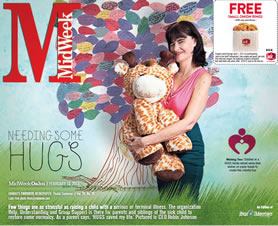Needing Some Hugs
Over the past 30 years, HUGS has helped support more than 1,500 family members for an average of three years each. The volunteer and community-supported agency receives funding through Aloha United Way, grants, donations and fundraisers. (More on that later.)
Additionally, hundreds are served through a hospital outreach program that includes Tripler Army Hospital.
The plight of military families is something to which CEO Johnson can relate. Born in Wisconsin, she was a globetrotter thanks to her military dad’s assignments in Europe and the Far East. She attended high school in Yokosuka, Japan, and also studied at the University of Maryland-Asian Division as well as Jacksonville University.
“I understand the adjustment families go through in a place where the culture and language are new,” she says. “I have particular empathy for what they go through in terms of isolation. I remember how traumatic it was when we were living in Spain and a sick sister had to be medevaced to Germany.”
Military personnel are among the broad-based population HUGS serves. As demographic changes of residents have changed, so have the services HUGS provides.
“As long as there is a need that we can address, we never turn away a client,” Johnson says, adding that HUGS services are free.
Health care providers who refer patients to HUGS claim that the agency provides the “human touch and compassionate counseling” that go beyond medical treatment.
Its Silver Lining Toy Chest program, for instance, distributes toys and gift cards to children undergoing painful treatments such as a spinal tap or bone marrow aspirations. Laughter Wagon engages children, teens and siblings in interactive games and activities that reduce stress and anxiety. Kokua Kupboard provides food to needy families.
Even while government stipends have softened during the recession, Johnson is pleased with the record performance of the agency and pioneering efforts such as HUGS GPS, which helps clients navigate a network of aid resources and agencies.
The productive and positive performance of last year gives her confidence for expanding HUGS’s reach to the Neighbor Islands and the Mainland.
“HUGS can be one of Hawaii’s most valuable exports,” she says. “The model started here and is now ready for expansion. There is a real need for the human-touch services that HUGS provides.”
The philanthropy specialist has 20 years of experience working in the nonprofit sector, and through her consultancy, Social Currency matches high net-worth individuals, trusts and foundations with local causes.
The philanthropic landscape of Hawaii is changing and evolving, Johnson says. Younger donors and newcomers to Hawaii are looking for charitable involvements and opportunities where they can see immediate results.
The large, established kamaaina family trusts are becoming a thing of the past. Development and fundraising strategies must adjust accordingly.
Which brings us to HUGS’s annual gala fundraiser.
Last year, its annual gala fundraiser raised $225,000. This year the goal is $275,000, and HUGS anticipates another sold-out event.
With the theme “Jungle Love,” the gala will take place Oct. 19 at The Modern Honolulu. Four hundred guests are expected to attend the charitable safari featuring five auctions, a fashion show and a roaring good time.
Advance table sales cost $3,000-$10,000 and take place through February, with a Las Vegas trip baiting a prize winner. For details, call HUGS at 732-4846 or go online to hugslove.org.
As the afternoon sun moved into the clouds over the HUGS House, we ended our interview with Johnson on the porch.
We had learned a lot about the organization and how it helps folks in the community. Now it was time to go.
But not before we gave each other, you guessed it, a hug.







